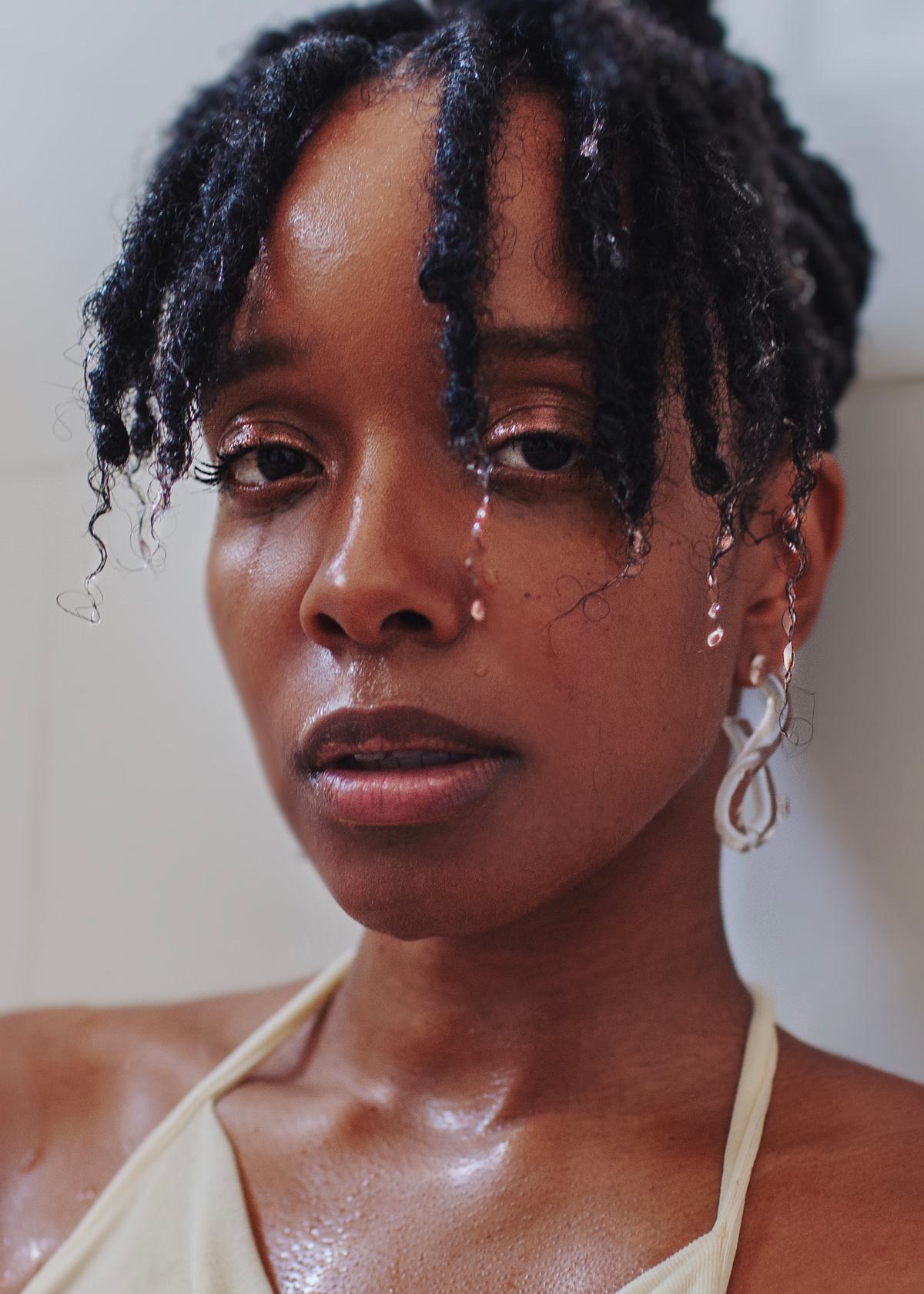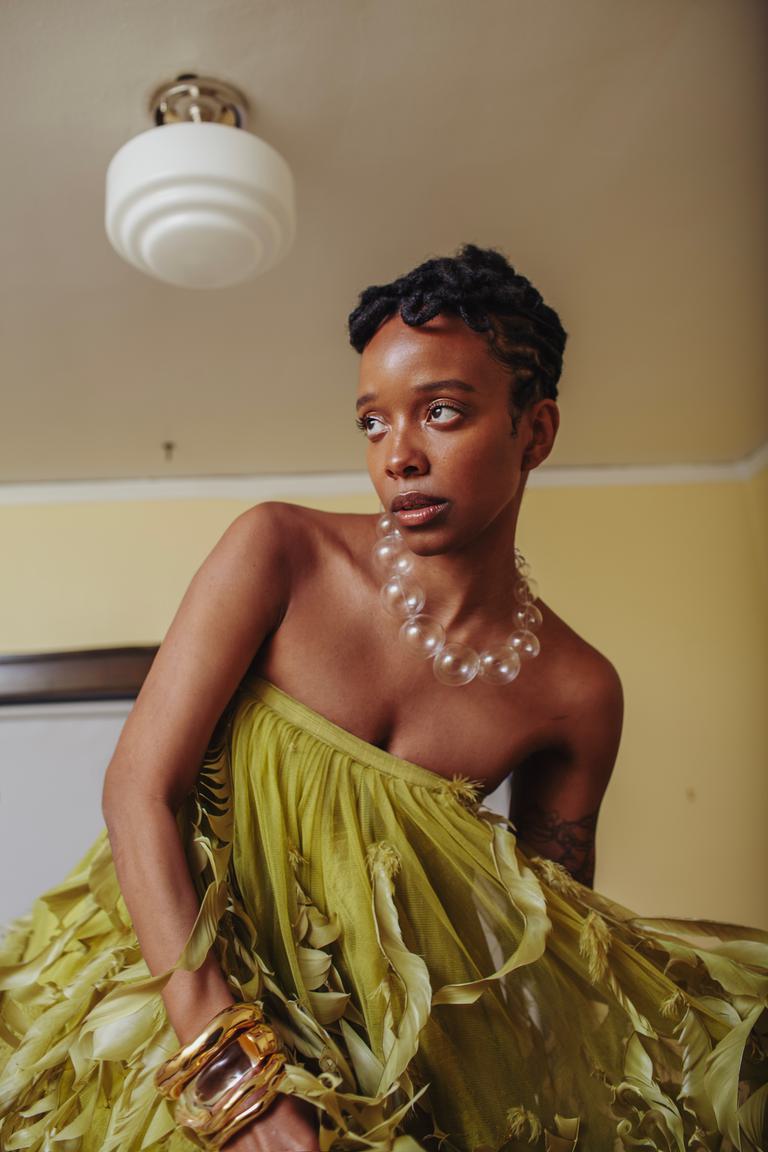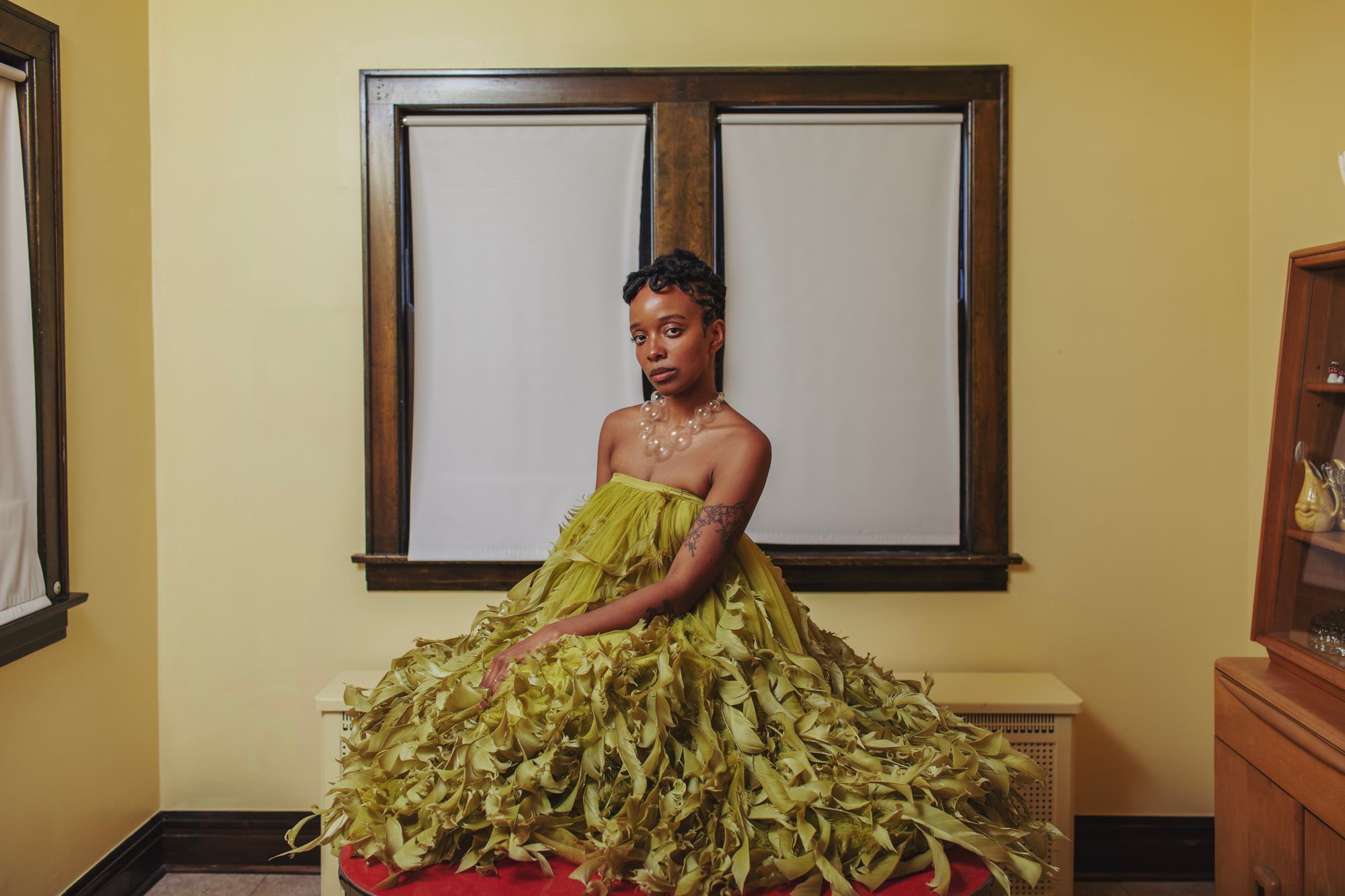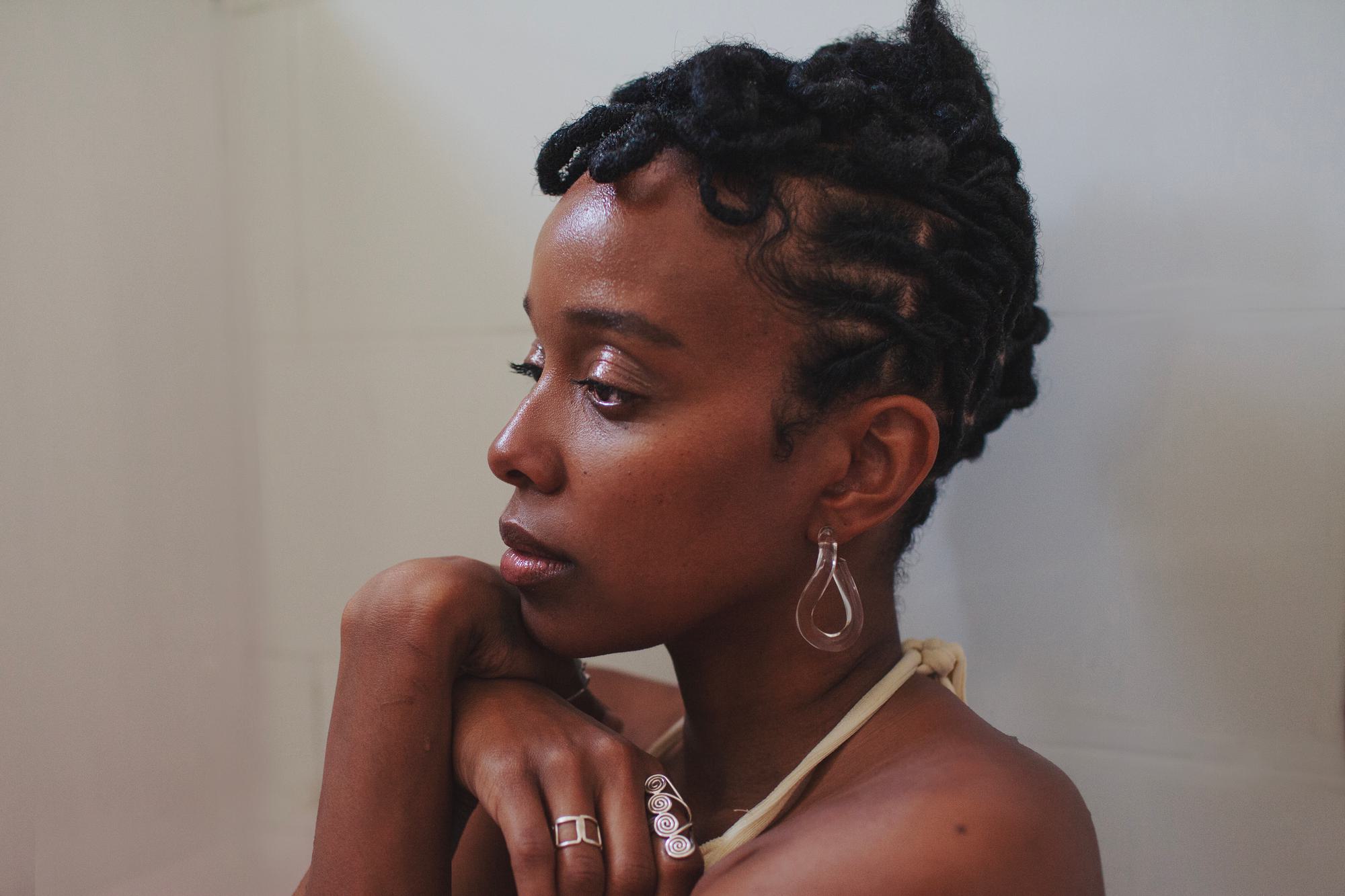
The tiny apocalypses of Jamila Woods
Chicago singer, songwriter and poet Jamila Woods reveals to Elise Soutar how an astrological perspective informed her creative approach to new record Water Made Us.
Jamila Woods has always worked with the language of apocalypses. Major themes of identity, community, injustice and power have been constant driving forces in her work, but even now, as she aims to capture in song the most intimate and vulnerable moments a person can live through, it still carries the force of walking into the wall of an ocean wave.
Woods' 2017 debut album HEAVN and its 2019 follow-up LEGACY! LEGACY! saw the multi-hyphenate artist take her background in poetry and translate it into music that carries the DNA of at least a dozen genres – the point of a Jamila Woods song is that it confounds in its inability to be defined. In the lead-up to the release of her third album Water Made Us, and speaking of that which confounds us, I get to talking with Woods about spiritual practices, mentioning my theory that younger people now gravitate towards concepts that predate organised religion because of how stifling those often archaic structures feel. Where else can people look for solace when it constantly feels like the world is up in flames – like every day feels like it marks another step towards a catastrophic end?
“That reminds me of a poem my friend Franny Choi wrote about apocalypses,” Woods muses from her home in Chicago. “They pointed out that there’s actually some kind of apocalypse every year. For example, there was an ‘apocalypse’ of boats during the Middle Passage. There’s always this idea of the world ending, but that keeps going on and on at the same time. I think about astrology in tandem with that. You can say, ‘The last time this transit happened was 83 years ago and it lines up with this terrible event, and it’s going to happen again.’”
Her cat runs across her desk, causing a blur of motion on my computer screen and providing us a second of light laughter to counterbalance the heaviness of the topic. “Everything always feels so high stakes,” she smiles, “but to zoom out, it’s like, we’re all still just spinning on a ball.”

Lowering the stakes is a key tenant of Woods’ latest full-length offering, whose title comes from a talk Toni Morrison gave in 1996 – specifically a quote she gave about the restructuring of the Mississippi River and how the water still floods in those areas cleared for liveable acreage. “All water has a perfect memory and is forever trying to get back to where it was,” the late literary giant said. While attempting to dissect a similar kind of muscle memory in terms of her patterns in romantic relationships, Woods put a pin in each tiny apocalypse she experienced – documenting each overwhelming feeling as it washed over her.
At another point in our conversation, Woods starts shuffling things around on her desk to look for an album “bible” she made after connecting with LA-based producer McClenney and beginning to piece the seemingly unrelated songs she’d written into something coherent. “I want it to sound multi-genre,” she had written in the notebook, “Oral, transcendent, open, introspective, mantra-like, vocal-centred. I want space for my voice to be heard.” These are loose, nebulous concepts, all difficult to translate into an album’s standard runtime – something Woods hit up against when she first started writing with no set plans in the early days of the pandemic.
“I'm not the most prolific in anything that I make, I feel like I'm a tinkerer,” Woods says as she thinks back to that period. “I discovered some common themes in the songs while I was reading a lot about love and relationships, but it was so strange. I was constantly thinking, ‘I can’t tell if I like this or I don't like this.’ I had this weird kind of detachment.” Though her prior albums had consisted of songs that started out as poems or which had been written within the parameters of a prompt she’d been given, the newfound freedom this process awarded her initially resulted in “making songs, but not enjoying it because I didn't know why I was making them.”
It took McClenney and Woods teaming up to begin sequencing these disparate stories of a relationship – from the playful early days of flirtation to the point of resignation that it all has to end – into an expansive but, as Woods puts it, “intentional” narrative. She remembers “Backburner,” a spare, largely guitar driven track buoyed by a skittering beat and vocal lines weaving through the open space – which eventually found its place in the middle of the loose song cycle – as a song that clued them into what the finished project could look like.
“We wanted to distil the feeling of jealousy or the feeling of having many loves and the capacity to love many people, but not having one take away from the other,” she says, “But then, if the other person in the relationship also takes that stance, how that's hard. Like, ‘What? It’s supposed to be just me.’” All of the complex, contradictory emotions presented in the song fed into the notion that the album wouldn’t just track the process of learning to love another person, but also how that vulnerability requires you to hold a mirror up to your own insecurities and faults. They sought to explore compromise, morality and the fine line where sensitivity crosses over into you ignoring your own needs. Who am I when I’m with this person?, the genre-spanning collection of songs seeks to answer, Does being that way serve either of us?
“Practice,” which closes out the album’s opening triptych and was the final track completed, marked another turning point where Woods understood the form the songs needed to take. Inspiration for the track stemmed from “this Abraham-Hicks talk about thinking of relationships as collecting data, and how you can just practise feeling loved or showing up for someone,” she remembers. “At the time, I was in a thing with a friend where we were deciding if we were gonna date or not. I was like, ‘Oh, my God, what if things don’t work out?’ and my therapist was like, ‘No, dating literally means you’re just seeing how it feels. Lower the stakes.’”
That advice guides that opening trio of songs – “Bugs,” “Tiny Garden” and “Practice” – along the coy, unsure path that a new relationship often follows. The first track in particular, adorned by keyboards and pizzicato strings, serves as an appropriate prelude: “Lower the stakes of your love / Why so much pressure? / Why not have pleasure on your way to the one / Or the second one, or the third?” Even while singing about trying not to micromanage, the hooks come cascading in a way that feels effortless, cocooning the tales of a nascent connection in the kind of lushness Woods envisioned in her initial plan for the album.

Only further expanding the scope of those voices carrying the album along, Woods’ harmonies are embellished by the voices of her family and friends – Fatimah Asghar, Indya Moore, Jasminfire, Krista Franklin and Woods’ Great Uncle Quentin make guest appearances during interludes and even in the middle of songs, seemingly adding a new perspective tailored to a specific situation explored in a song, even if the voice and sentiment were captured organically. Collaborators like Saba, Peter CottonTale and duendita also provide verses, adding colour to the extremely personal statement being put forth, but never feeling like they’re crashing Woods’ narrative throughline.
Of course, right when we find ourselves getting comfortable at the close those first three songs, she reveals she’s buried the lede when you’re listening straight through the record, finally stating her intention in the interlude “let the cards fall”: “I want to know how to trust myself to know when to stay in a relationship, to keep working at it, or let it go when it’s not safe or not working.”
It is in this less-defined middle portion of the tracklist that Woods takes on totally new sonic and thematic ground, delivering the one-two punch of the devotional, gospel-inflected “Send a Dove” and a fragile reckoning of a ballad, “Wreckage Room” – the latter of which might serve as the album’s most devastating moment. Though both sets of lyrics speak to the desire to nurture a partner or save them from themselves, it’s almost as if there’s a scene cut out in the middle – one that marks the turning point from honouring that sacrificial urge to feeling like said urge is eating away at you. Or maybe there’s no cut, maybe these emotions co-exist and clash: one expressed when we’re talking to the person we love and one felt when they close the door on us a second later. “I couldn’t smile any harder,” she sings through a distorted, down-pitched vocal effect following an intro of chaotic piano runs, “I couldn’t be any more free / I tried to feed your hunger / Until it swallowed me.”
"As a Libra, with every decision, I’m always thinking ‘How does that affect everybody else?’ instead of figuring out ‘What is right for me right now?’"
“Wolfsheep,” powered along by the unassuming strum of an acoustic guitar, marks another turning point in the album’s exploration of its subject matter, turning from that nervous innocence you feel when you’re learning about your partner to the point where you might doubt their morality, and therefore, your own. “Everybody's good, no one is,” the refrain repeats as Woods finds herself returning to that question of knowing whether she can trust herself when faced with such an existential dilemma. Containing a reference to pulling the Tower card from a tarot deck – representing chaos in a situation or the downfall of something – the track also taps into another common thread in most of Woods’ work: divination and astrology.
It comes up several times during conversation, even before I ask my formal question about her connection to it; when first explaining how she and McClenney decided how they were going to structure the album, she laughs about how she always says “our Virgos met each other, because I have Mercury in Virgo and he’s a Virgo, so we were like, ‘Okay, we can make sense of all of this. We're gonna figure out what the math is.’”
The album is peppered with callbacks to these things – frequent references to water in the lyrics often mention cups, the suit in tarot which broadly relates to emotion and intuition. The spoken-word track “I Miss All My Exes” even alludes to partners “who don’t believe what I say about the stars, but listen anyway, who don’t believe what I read in the cards, but ask anyway.”
There’s even a brief interlude dedicated to Woods being a Libra, poking fun at the sign’s association with indecisiveness before segueing into the fittingly playful synthpop bounce of “Boomerang,” which admonishes a non-committal partner (“I think you really wanna dance with me / How could you really wanna dance with me? / Do you really wanna dance? / If you don't like me then, you won't like me now”).
“My journey with tarot is reflected in the album in terms of learning to listen to my inner voice,” Woods says, referring back to the original mission of her learning to trust herself in relationships. “As a Libra, with every decision, I’m always thinking, ‘How does that affect everybody else?’ instead of figuring out, ‘What is right for me right now?’” In an attempt to let those intuitive instincts sprawl out, the record hits on those complications and lets itself sit with their discoveries. What could, in the hands of a less talented writer, end up reading as advice column fodder on how to handle yourself when you’re entering a new relationship or leaving an old one, emerges as a deeply-felt, honest reflection of the universes a single person can hold within when they’re forced to so closely examine themselves and the way they love others.

Even with the trio of breakup-adjacent songs at the end, nothing is particularly angry – it’s just working through the ways you’ve changed during the process, rather than skirting around the discomfort that self-examination can bring. “Still,” the song which opens this last group at the tailend of the cycle, went through a number of changes before landing on its relatively airy, bass-centred groove; Woods remembers an early version that was “more like a sort of emo, poppy thing.” The lightness in its instrumentation pairs nicely with the song’s meditation on how each person you let into your circle leaves you different than how they found you – other iterations of the song might have held the weight of regret which can come with that. This version feels more like a gentle reminder to check in on the mark that person left on you and re-calibrate accordingly.
“We needed that song to go like near the end because, in terms of the cycle, it's where you're realising that your person is still with you even if they’ve physically left you,” Woods says, “but that’s also kind of a beautiful thing.”
She says she still consults with different astrologers on a regular basis; when it came time to gauge what the weather of the universe would be for the album’s potential release date, she consulted with astrologer and musician Akenya. Like the ebbs and flows of a relationship, the stars stick to no structure or defined schedule – much to the evident confusion of her label, who just ended up giving her a few dates to pick from and let her run with whichever one had the best astrological forecast. She seems amused when I point out that the album will be a Libra, like her.

Logistics aside, she confirms that receiving that guidance helped to quell her internal fears about releasing so much material that dealt exclusively with her – Jamila’s thoughts, Jamila’s feelings, Jamila’s shortcomings, Jamila’s triumphs – for the first time. “I think I was feeling, ‘Are my emotions worthy of so many songs?’” she says. “Then, I had an astrologer tell me, ‘When you're writing songs, you're writing about yourself, but you're also healing the throat chakras of women in your bloodline who weren't able to write about these things so openly. Think about how they feel. They just had to get it done, get the food on the table. They didn't have the time or the luxury of that.’” There’s a smile on her face as she relays this, like the thought of playing messenger for those with their tongues cut out makes her want to sit up straighter. She has reason to feel that kind of pride. “That helped me reframe.”
Since officially finishing the album in March, Woods has been in a transitional state; if the relationships in her life continuously change who she is over time, the creative work she puts out into the world pushes and pulls at her too. She recounts how touring LEGACY! LEGACY! on the tailend of a breakup helped her to rebuild her confidence – a song’s meaning could transform from listening session to listening session, from performance to performance.
“It’s like a time capsule. You know the Harry Potter thing where you can physically go back into a memory?Well, that’s what it feels like to perform it,” she laughs. “Also, I’m different every time, not just the song. With LEGACY!, I wrote the perfect album for what I needed on that tour without knowing it. [Each album] always brings me something different at every stage: writing it, making videos, talking about it and then performing it.”
Jamila Woods sits, ready to unleash her expansive, open, introspective, mantra-like, vocal-centred document of the way she’s transformed onto the listening public, prepared to leave herself vulnerable to whatever shifts her again – ready for you to transform her by witnessing her – and says, “I'm curious to see what this one will bring me.”
Get the Best Fit take on the week in music direct to your inbox every Friday

Lorde
Virgin

OSKA
Refined Believer

Tropical F*ck Storm
Fairyland Codex





